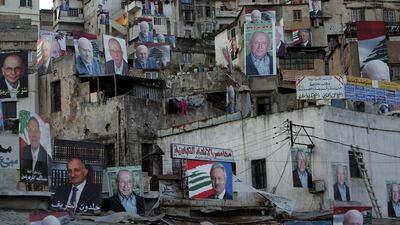On Sunday, Lebanon will hold its first parliamentary elections since 2009. While the forthcoming elections are not expected to bring major changes, the political landscape has been transformed dramatically since the previous ones. Five things in particular will be worth looking out for.
The first is determining whether the current electoral law, based on proportional representation for the first time, will actually allow a significant number of new figures to enter parliament. Traditionally, the Lebanese political classes have adopted election laws that perpetuate their power. The current law is likely to reduce the blocs of most politicians or parties without, however, seriously undercutting their influence.
A factor that will play against lists of less-established candidates is that the cut-off percentage for elimination is regarded as relatively high, although the exact number depends on the number of voters in a district. This will reduce the latitude of such lists to enter parliament and will favour the major politicians and parties who have sizeable electorates in each district.
A second thing to look out for, which derives from the first, is how fragmented parliament is at the end of the elections and what this means for the balance of power in the country. Hezbollah was particularly happy with the proportional law because the party assumed this would do two things – reduce the large parliamentary blocs of its rivals and allow smaller, pro-Syrian parties or candidates to enter parliament as its allies.
This might well happen but more broadly, a fragmented parliament will also make consensus over future policy more difficult and contentious. At a time when the country is going through a major financial and economic crisis and there is a blueprint for economic and sectoral reform, a disjointed parliament might pose a major challenge down the road.
A narrower outcome to examine is how the alliance of Lebanese President Michel Aoun and his son-in-law Gebran Bassil with Prime Minister Saad Hariri will fare. Mr Aoun and Mr Hariri were rivals in the 2009 elections but that changed when Mr Hariri supported Mr Aoun's presidency in 2016. Today the two are allied in several districts and Lebanon's Shia parties, particularly Hezbollah, will be watching closely to see what happens.
The reason is that an alliance between Mr Aoun, a Maronite Christian, and Mr Hariri, a Sunni, could revive the communal partnership that dominated Lebanon for much of the post-independence period, when the Shia were marginalised. Hezbollah is keen to see if this might hinder its own agenda in Lebanon. The party wants to retain latitude to act on Iran’s behalf but if the state, embodied by the Aoun-Hariri alliance, works against this or simply does not support it, the party might be constrained.
For now, both Mr Aoun and Mr Hariri have pursued a conciliatory approach with Hezbollah. Mr Aoun has vowed to maintain his alliance with the party that was established in 2006. Mr Hariri knows that his return to office as prime minister depends on not alienating Hezbollah. However, in the event of a major war between Iran and Israel which encompasses Lebanon, Hezbollah has to be sure that it would not find itself isolated in the aftermath of such a conflict.
__________
More on the election from The National's foreign editor Arthur MacMillan in Beirut:
In Lebanon, women vote but few are chosen
Lebanon paves way to election as regional tension soars
__________
A fourth thing to watch for is which of the major Maronite Christian candidates emerge from elections in a position that would allow him to come across as a legitimate presidential candidate when Mr Aoun leaves office. Under Lebanon’s unwritten understanding, the president is always a Maronite Christian and is elected by parliament.
Mr Bassil is hoping to enter parliament for the first time and is a major presidential contender, as are Samir Geagea and Suleiman Franjieh. Neither of the latter two is a parliamentary candidate but both have a stake in ensuring their candidates do well, as leverage for a presidential bid. Mr Franjieh is an ally of Syria so his chances of becoming president are real while Mr Geagea, the head of the Lebanese Forces Party, sees the proportional law as boosting his party’s representation in parliament.
A final thing that will be interesting to determine is whether Hezbollah’s hold over the Shia community is as considerable as is generally assumed. In that regard, the election in the Baalbeck-Hermel district will be a useful barometer. Its large Shia electorate is mainly of tribal background and while it has supported Hezbollah, it has also often acted independently of the party, something much rarer among the Shia of the south.
While there is a Shia majority in the Baalbeck-Hermel district, there is also a significant Sunni and Christian minority. Opposition to Hezbollah will be led by Mr Hariri and Mr Geagea, in collaboration with a Shia notable from the region. While Hezbollah is likely to win most seats, Mr Hariri’s and Mr Geagea’s aim will be to defeat one candidate in particular, namely Jamil Al Sayyed, a bitter enemy of both men. He is backed by Syria and was reportedly placed on Hezbollah’s list at Syria’s request.
If Mr Al Sayyed fails to win, losing to a Shia on the Hariri and Geagea list, this would be humiliating to Hezbollah. It would mean the party failed to fulfil its commitment to Syria against a Shia challenge in an area the party considered a stronghold. It would not change much but it would show that Hezbollah cannot take its community for granted, at a time when its regional adventures are causing uneasiness at home.
Michael Young is editor of Diwan, the blog of the Carnegie Middle East programme, in Beirut


